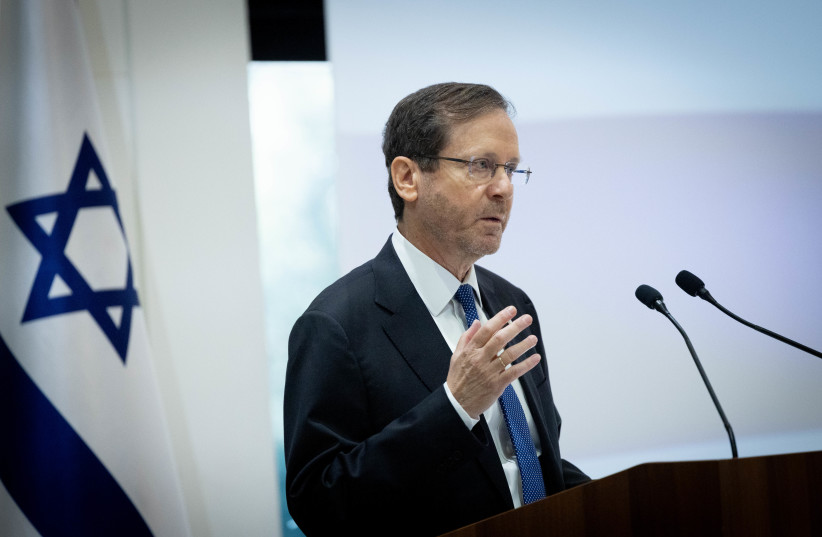Israel accused the United Nations of not being able to handle the flow of humanitarian assistance into Gaza, despite demands for it, while the organization’s Security Council prepared to debate a resolution to speed up said aid, and the international community continued to call for a ceasefire.
“We are working to facilitate a dramatic increase in humanitarian aid entering Gaza from the very first moment” of the war, President Isaac Herzog told the French Senate President Gérard Larcher during a meeting in Jerusalem.
“We can enable the entry of 300 or even 400 trucks a day, this is tens of thousands of tons of humanitarian aid a day,” he said.
“Unfortunately, due to the decisive failure of the UN in its work with other partners in the region, they are unable to bring in more than 125 trucks a day.
“Meaning, today it is possible to provide three times the amount of humanitarian aid to Gaza if the UN, instead of complaining all day, would do its job,” Herzog said. He issued a similar statement on Wednesday.

His comments came as a UN-backed body, the Integrated Food Security Phase Classification (IPC), published a report warning that all the 2.3 million Palestinians in Gaza face “crisis levels of hunger” and as the enclave faces a famine.
“There is a risk of famine and it is increasing each day that the current situation of intense hostilities and restricted humanitarian access persists or worsens,” the IPC report said.
Trucks delivering aid from Egypt have transferred some food, water, and medicine, but the United Nations says the quantity of food is just 10% of what is needed for the territory’s inhabitants, most of whom have been displaced.
“There is a risk of famine and it is increasing each day that the current situation of intense hostilities and restricted humanitarian access persists or worsens,” the IPC report said as it gave the enclave its highest warning level of Phase 5.
“This report sort of confirms our worst fears,” said Arif Husain, chief economist and director of research at the UN World Food Programme, calling the crisis “unprecedented.”
“I’ve been doing this for the last 20-plus years. I’ve been to Afghanistan, I’ve been to Yemen, Syria, South Sudan, Ethiopia, northeast Nigeria. But I’ve never seen something this bad happening this quickly,” he told Reuters in an interview.
The UNSC is expected to meet on Friday to debate a resolution to speed up humanitarian aid to Gaza.
Crossing initially closed after October 7
Israel had initially closed its crossings into Gaza at the start of the war on October 7, forcing the Egyptian crossing at Rafah to serve as the sole passageway for goods into the enclave. It also limited those goods to basic humanitarian products, such as food and medicine.
The crossing, however, was not designed to handle the necessary flow of goods. This month, under pressure from the US, Israel temporarily reopened its major commercial crossing into Gaza at Kerem Shalom, including for a limited amount of commercial goods, a move which helped increase the number of trucks that could enter Gaza.
The IDF’s military campaign to oust Hamas from Gaza, sparked by the terror group’s infiltration of southern Israel on October 7 when it killed over 1,200 people and seized around 240 hostages, has complicated the distribution of that aid.
The intense combatant reality and the mass displacement of 1.9 million Palestinians who sought the narrow safety strips within the enclave, along with the breakdown of utilities, has created a situation that has made it difficult to operate.
Distribution of aid within Gaza has been hampered by military operations, inspections of aid demanded by Israel, communications blackouts, and shortages of fuel.
Some desperate Gazans have jumped onto aid trucks to try to grab scarce supplies of food and other goods. There have been reports of residents eating donkey meat and emaciated patients seeking medical help.
The United Nations has repeatedly called for a humanitarian ceasefire to allow for a distribution system. Israel has allowed for brief targeted pauses in specific areas of Gaza to help with aid distribution but has linked any pause in the war to a deal to release hostages.
At the UN in New York, the Secretary-General’s spokesperson Stephane Dujarric explained that the absence of a ceasefire made aid distribution difficult.
“We are working with all involved to ensure that the flow of goods into Gaza is sufficient, predictable, swift and delivered and based on what people need most,” Dujarric said.
“While the current scale of supplies entering Gaza falls short of what is required, what is equally crucial is to re-establish the conditions within Gaza that allow for meaningful, efficient, and large-scale humanitarian deliveries,” he stated.
“Currently, intense fighting, the lack of electricity, limited fuel, and disrupted telecommunications severely restrict access to loading points and trucks, as well as the ability to deliver, prioritize, plan, and coordinate critical operations – with civilians bearing the brunt of the suffering that is going on,” Dujarric explained.
“The impediment is that there continues to be a conflict going on, the only way we can go into those areas.. is by having security guarantees and going through a humanitarian deconfliction process,” he said.
“We do not send conveys into the heat of battle without having the necessary deconfliction mechanism in place and agreed to,” Dujarric said.
Reuters contributed to this report.
